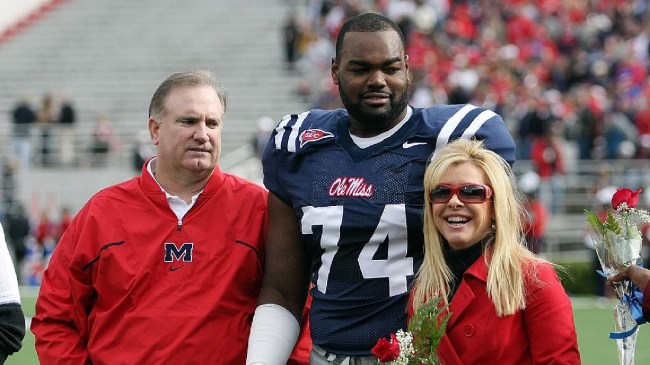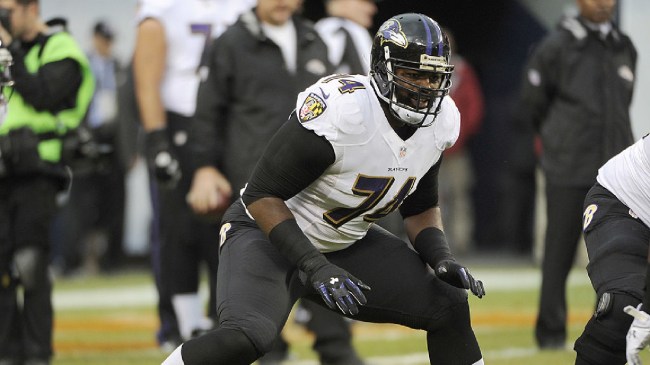
Getty Image
In 2009, The Blind Side raked in more than $300 million at the box office thanks to viewers who were drawn in by the inspirational story of Michael Oher, the football player who overcame a ton of adversity to pursue a successful career as an offensive tackle at Ole Miss and in the NFL.
However, accusations in a bombshell lawsuit Oher filed against Leigh Anne and Sean Tuohy (the heads of the family that raised him) seem to reflect a reality many people were aware of to some degree: the Michael Oher story—at least the one chronicled in The Blind Side—was a lie.
Listen, I love a feel-good story as much as the next guy, but Hollywood has been known to bend the truth in order to create movies that will appeal to the general public, and The Blind Side boasted a narrative that has always seemed a bit too feel-good to be true.
When the movie came out, I was 15 years old, so while I didn’t exactly view myself as a film critic, I had trouble understanding why it was such a huge hit.
That’s not to say I didn’t understand the appeal of a tale involving a white family adopting a homeless black teenager, bringing them into their home, and helping him develop his natural gifts and talents to ultimately make it to the NFL.
On paper, it’s a moving and emotional saga that everyone could get behind—assuming it went down the way Sandra Bullock and the Hollywood producers who spun it would lead you to believe.
However, once you took a closer look at the details, it raised a lot of questions that deserve a second look now that Oher has come forward to challenge the narrative.
All of the ways The Blind Side embellished the life of Michael Oher

Getty Image
It’s worth noting The Blind Side was based on a book by widely-respected author Michael Lewis that was published in 2006, and while the screenwriters obviously drew on it for inspiration, they also took plenty of liberties.
Oher certainly had a difficult upbringing and an unstable childhood; his mother’s battle with addiction and his father’s inability to stay out of prison saw him bouncing in and out of foster homes and dealing with extended periods of homelessness.
However, Oher understandably took issue with how The Blind Side handled his supposedly subpar intelligence. If you saw the movie, you might think he was a borderline mute with an alarmingly low IQ, but he asserted he simply hadn’t been given the opportunity to thrive in an academic setting.
The Blind Side also caught some heat for being one of the many films that rely on the “white savior” approach, and while there’s only so much you can do to avoid that narrative when you consider the real-life circumstances, Oher disputed the notion that he wouldn’t have even been interested in football without the Tuohys (he’d taken a liking to the sport—along with basketball and track and field—before they crossed paths).
Of course, The Blind Side also leads viewers to believe the Tuohys eventually adopted Oher, and the fact that he challenges that in the lawsuit he filed is one of the more shocking fabrications based on his claims about how things actually went down.
The legal filing asserts Oher was never legally adopted but that he was rather tricked into signing a document that made the Tuohys his “conservators” (defined as “a person or organization that has been legally chosen to control the finances or property of another person, company or organization”).
You obviously can’t blame Michael here, and you really have to feel bad for him if that’s actually what went down.
When you’re a naive teenager dealing with chronic homelessness on the streets of Memphis without a penny to your name, signing a piece of paper in exchange for a warm bed provided by a seemingly loving family sounds like a pretty good deal. What do you have to lose?
Some people may wonder why it took Oher so long to come out against the Tuohys. The movie (and its inaccuracies) have been a topic of conversation for more than a decade, so why did he decide now was the time to take action?
Well, according to the petition, Oher didn’t realize he’d agreed to a conservatorship until the beginning of 2023 and took another look at the document that made him realize he had “no familial relationship [with the Tuohys].”
To make matters worse, the Tuohys allegedly used those conservator powers to strike the deal that led to the blockbuster movie being made and allowed them (and their two legal children) to rake in millions while Oher—who is essentially responsible for the movie being made in the first place—received nothing aside from the $14,000 Lewis sent his way after receiving a check for licensing the book.
It’s worth noting Sean and Leigh Anne issued a statement disputing Oher’s account of what actually transpired, saying, “We’re devastated…but we’re going to continue to love Michael at 37 just as much as we did at 16.”
While Oher had previously been quoted as “being content” with how the movie portrayed him, it appears he’s had enough—and if he’s right about what actually went down, it’s pretty hard to blame Big Mike.